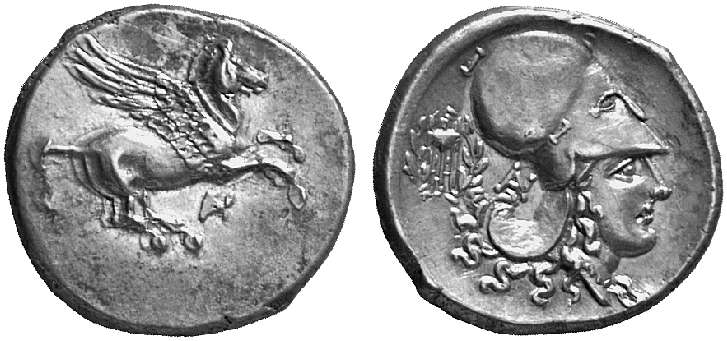1831 - Locri Epizephyrii (nomos Zeus/eagle) over Anactorium (Pegasus/Athena) (New York, ANS, 1944.100.7024)
From SILVER
400 BCE - 300 BCEΛΟΚΡΩΝ
Location/history
| Museum collectionMuseum collection: | New York, American Numismatic Society, 1944.100.7024 | |
| Private collection(s)Private collection(s) ᵖ: | E. T. Newell collection |
Overstriking coin
Description
| ObverseInscription or printing placed on the obverse.: | ΛΟΚΡΩΝ (Greek) Head of Zeus left, wearing laurel wreath | ReverseInscription or printing placed on the reverse.: | Eagle flying left, dead hare in talons. Lower lef, thunderbolt. In right field, monogram (AP). |
Mint and issuing power
| MintIdentifies the place of manufacture or issue of a numismatic object.: | Locri Epizephyrii | Ancient regionAncient region. | Bruttium | Modern countryModern country: Italy | AuthorityIdentifies the issuing power. The authority can be "pretended" when the name or the portrait of X is on the coin but he/she was not the issuing power. It can also be "uncertain" when there is no mention of X on the coin but he/she was the issuing power according to the historical sources: |
Chronology
| FromIdentifies the initial date in a range assigned in a numismatic context. 400 BCE toIdentifies the final date in a range assigned in a numismatic context.. 300 BCE | Classical 480-323 BC |
Physical description
| MetalThe physical material (usually metal) from which an object is made.: Silver |
WeightWeight of the numismatic object (in grams). in grams: 7.467.46 g <br />7,460 mg <br /> | DenominationTerm indicating the value of a numismatic object. Examples: tetradrachm, chalkous, denarius.: nomos | AxisDescribes the directional relationship between the obverse and reverse of a numismatic object.: 77 mm <br />0.7 cm <br /> |
| StandardStandard.: Achaian | |||
References
| Coin referenceReference of the Coin: | Noe 1957, group VIII, p. 35, pl. XII, g, SNG ANS 3 Bruttium-Sicily, n° 525 | Coin series referenceReference to coin series study: | Noe 19571Noe 1957, group VIII, p. 35, pl. XII, g, SNG ANS 3 Bruttium-Sicily2SNG ANS 3 Bruttium-Sicily, n° 525, HN Italy3HN Italy, n° 2319-2328, HGC 14HGC 1, n° 1565 |
| Coin series web referenceCoin series web references: | |||
Overstruck type
Description
| ObverseInscription or printing placed on the obverse.: | Pegasus flying l., below, monogram | ReverseInscription or printing placed on the reverse.: | Head of Athena l., wearing Corinthian helmet |
Mint and issuing power
| MintIdentifies the place of manufacture or issue of a numismatic object. ᵖ: | Anactorium | Ancient regionAncient region. ᵖ | Acarnania | Modern countryModern country: Greece | AuthorityIdentifies the authority in whose name (explicitly or implicitly) a numismatic object was issued. ᵖ: |
Chronology
| FromIdentifies the initial date in a range assigned in a numismatic context. 410 BCE toIdentifies the final date in a range assigned in a numismatic context.. 350 BCE | Classical 480-323 BC |
Physical description
| DenominationTerm indicating the value of a numismatic object. Examples: tetradrachm, chalkous, denarius. ᵖ: | stater |
References
| Coin type referenceReference to coin series study ᵖ: | Calciati 19905Calciati 1990, n° 70 | ||
| Coin series web reference overstruckCoin series web references overstruck: | |||
Additional data
| Frequency of overstrikesFrequency of overstrikes: | rare and concentrated | Level of confidenceLevel of confidence of the identification: | weak |
| RemarksRemarks: | nb: unlikely to be an overstrike as argued by Noe (the monogram is part of the type, not the remnant of an undertype) | ||
References
- ^ Noe, Sydney P. (1957), "Overstrikes in Magna Graecia", American Numismatic Society. Museum Notes 7, p. 13-42, pl. 5-14.
- ^ Troxell, Hyla A. (1975), Sylloge Nummorum Graecorum ANS 3. The Collection of the American Numismatic Society. Sicily 3 (Bruttium-Sicily I: Abacaenum-Eryx), New-York, pl. 38.
- ^ Rutter N. Keith et alii (eds.) (2001), Historia Numorum Italy, London, xvi, 223 p., 43 pl.
- ^ Hoover, Oliver D. (2018), The Handbook of Greek Coinage Series, Volume 1. Handbook of Coins of Italy and Magna Graecia, Sixth to First Centuries BC., Lancaster-London, 2018, lxi, 527 pages, 23 cm
- ^ Calciati, Romolo (1990), Pegasi, Mortara, Edizioni I.P..

